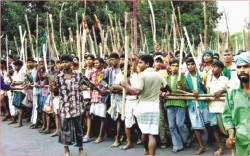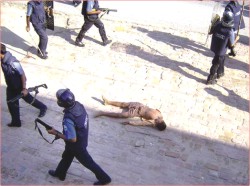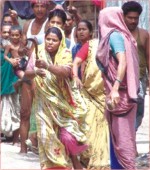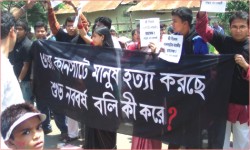
Inside
|
The story of People Power Syed Badrul Ahsan traces the history of popular uprisings in Bangladesh from 1948 to the present day movements in Kansat, Phulbari, and Shonir Akhra.
One would have thought the protest would be heeded, that Jinnah, the Quaid-e-Azam who had successfully wrenched a new state out of a whole and wholesome India, would defer to the wishes of the majority segment of Pakistan's population. But he gave short shrift to a student delegation led by Abdur Rahman Chowdhury, subsequently to be a judge in the High Court of Bangladesh. Such behaviour came in tandem with the demand made by Dhirendranath Dutta that Bengali be made one of the languages in the Constituent Assembly of Pakistan. Protest in 1952
An instance one could cite here is the growing disenchantment of Bengalis over the language issue, a sentiment that Pakistan's governing class not only ignored but also considered to be detrimental to the national interest. The matter of public welfare was, therefore, swiftly transformed into an issue to be tackled on the streets. What, therefore, occurred in Dhaka on February 21, 1952 was the first organized demonstration of the popular will in East Bengal, indeed a potent sign of the extent to which the ruling classes were prepared to go to suppress political and cultural dissent, as well as the degree to which large bodies of citizens could, or would, organize themselves in spontaneous protest against the depredations of a vested class of unrepresentative politicians. Tagore recalled, 1961 In the years that remained of Bengali participation in Pakistan, till the War of Liberation and its successful culmination in December 1971, it was poetry based on the spirit of popular upheaval that injected newer doses of vitality into Bengali nationalistic politics. The vitality, having been smothered for a few years, time that took into account the arrival of the Ayub Khan martial law regime, stirred once more in rather improbable ways. It was the centenary observance of the birth of Rabindranath Tagore in 1961 that served as a new catalyst for public celebrations of the popular will. The state of Pakistan looked askance, and worried, as Bengalis defied military rule to reassert their cultural traditions. People Power, rendered a galvanizing force with the presence of such iconic figures as Justice Syed Mahbub Murshed, was clearly on its way to becoming a defining characteristic of Bengali society.
A truly proper instance of how the depredations of the state could actually be checked came through the spontaneous protests by students of Dhaka University when the Hamoodur Rahman Commission report on education was made public in 1962. It was, once more, a time for historical forces to go to work. On the one hand, the state refused to take the views of the men and women who constituted it into account as it devised policy. On the other, it was the people who were once again required to marshal their forces in order to compel the establishment to retreat. The energy that went into the defiance of Hamoodur Rahman worked, which of course was not the end of the struggle. People Power was set to demonstrate its inherent strength again through the long campaign to free Rabindranath Tagore from the grip of Field Marshal Ayub Khan and Khwaja Shahabuddin. When the authorities took it upon themselves to clamp a ban on Tagore music, the nefarious purpose being a stamping out of "Hindu influence" in Bengali society, one needed not much profundity to know that a new, long and sustained movement for an attainment of fundamental rights was called for. Between 1964 and 1969, the latter year symbolizing the fall of the Ayub coterie, it was the collective will of Bengalis which upheld the iconic image of Tagore in the country. Six Points, Bhashani, 1971 By the end of 1968, as demands arose in the province for the withdrawal of the Agartala conspiracy case and the release of Sheikh Mujibur Rahman, newer dimensions came to envelop the principle of People Power. An increasingly isolated administration, both at the central level in Rawalpindi and in the provincial capital Dhaka, noted with dismay the extremism which soon began to underlie People Power, thanks largely to the efforts of Moulana Abdul Hamid Khan Bhashani. It was his threat, in a very large way, to lead a march of millions to the Dhaka cantonment to free Mujib that brought home to the rulers the gravity of the conditions they were presiding over, or losing control of. By March 1971, People Power had turned into a fact of life, even if it was tentative, in Bangladesh (and that was how Bangabandhu and the Bengali nation had begun referring to the province) as politics veered sharply away from the idea of a united Pakistan and towards a sovereign Bengali state. For a period of twenty-five days, a de facto administration led by Sheikh Mujibur Rahman, galvanized by a groundswell of public support as he sought to negotiate a way out of the crisis with the rest of Pakistan, operated in what was soon to be a country engaged in an armed struggle for freedom. It would be fair to suggest here that if People Power embraced a clear spirit of radicalism in the late 1960s, it had in March 1971 started defining itself in terms of nationalistic militancy. That obviously worked as a huge factor in a building up of the resistance to the Pakistan occupation army all through the nine months of the War of Liberation.
But resistance did get shaped once General Ershad seized power, and at a time when an elected government was in office. Politics was in a messy state, but it certainly did not call for the overthrow of the democratic process. Over the next nine years, therefore, it became a natural activity for the nation to oppose a regime that had never been accepted as a legitimate government. The result was the great build-up to an explosion --- and then the explosion itself in December 1990. But the fall of the Ershad regime was not to be a phasing out of People Power. The rigged by-election in Magura in 1994 was proof, if proof were at all needed, that politics in Bangladesh was still subject to the whimsicality of the ruling circles. The whimsicality only acquired a bigger dimension by early 1996 when the ruling Bangladesh Nationalist Party organized general elections which clearly undermined participatory parliamentary politics. When that happened, it was the Janatar Mancha that emerged. That the Janatar Mancha served to redefine politics, despite everything its detractors might say about its scope and its effect on the various institutions of the state, cannot be gainsaid. It was, in essence, a serving of notice on erring politicians that their inability to put a leash on unbridled ambitions could yet produce a necessary backlash, of the kind that would put matters back in perspective. Given such a background, in historical terms, of the nature and prevalence of People Power, one really ought not to be surprised at the vehemence with which popular sentiments on public issues came to be illustrated in Phulbari, Kansat, and Shonir Akhra. It then follows that the civil disobedience, for so it is, that has lately been organized by the fourteen-party alliance in the campaign to promote free and transparent general elections in early 2007, is but a deference to political heritage. People Power, you might say, and with good reason, has cushioned Bangladesh through all the bad patches in its history. It remains a theme that the nation could always fall back upon every time the state and the constitution were speared by the morally unscrupulous and the politically unprincipled. Syed Badrul Ahsan is Executive Editor, Dhaka Courier. |
 Ît was a single voice that left an entire hall of people stunned. And it must have come as a rude shock to Mohammad Ali Jinnah to be told that his word was not law, that it did not have to be accepted as universal truth. When that voice, on a day in March 1948 in that cavernous Curzon Hall of Dhaka University, screamed: "No! No!" to protest Jinnah's assertion that Urdu would be the language of the state of Pakistan, it was the first tentative sign of People Power coming into play in the land of the Bengalis.
Ît was a single voice that left an entire hall of people stunned. And it must have come as a rude shock to Mohammad Ali Jinnah to be told that his word was not law, that it did not have to be accepted as universal truth. When that voice, on a day in March 1948 in that cavernous Curzon Hall of Dhaka University, screamed: "No! No!" to protest Jinnah's assertion that Urdu would be the language of the state of Pakistan, it was the first tentative sign of People Power coming into play in the land of the Bengalis. The Constituent Assembly, for all the excitement generated by the adoption of such measures as the Basic Principles Report of 1950, stumbled with every step it took. The hold the ruling Muslim League exercised on the assembly effectively stymied the process of democracy, with the inevitable result that an entrenched system of politics soon cast its shadow across the country. It is fairly reasonable to think that the rulers operated through a clear ignorance of the laws of basic politics.
The Constituent Assembly, for all the excitement generated by the adoption of such measures as the Basic Principles Report of 1950, stumbled with every step it took. The hold the ruling Muslim League exercised on the assembly effectively stymied the process of democracy, with the inevitable result that an entrenched system of politics soon cast its shadow across the country. It is fairly reasonable to think that the rulers operated through a clear ignorance of the laws of basic politics. Student protest, 1962
Student protest, 1962 Janatar Mancha, et al
Janatar Mancha, et al